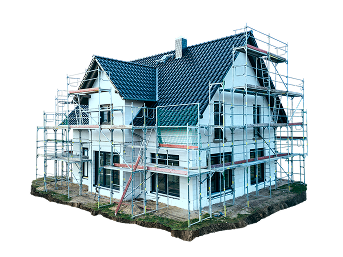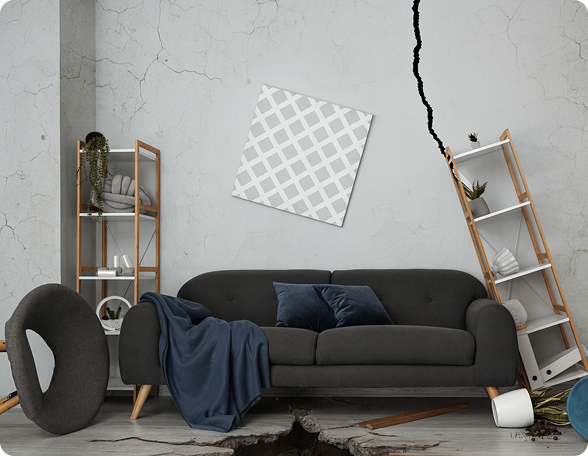Are you getting the
best home insurance for your
property?
Insurance companies' prices fluctuate constantly based on underwriting methods, labor costs, and inflation. Take 3 minutes to check if you have the best rates for your coverage.
Trusted by the best


How to use
QuoteKings
-
1. Describe your preferences
Answer a few questions about yourself, your home, and the coverage you are looking for. -
2. Compare rates
We collect current-day quotes from hundreds of insurance companies and present them to you for comparison. -
3. Choose your policy
Pick the option best suited to your preferences and enjoy cost-efficient protection of your home.
What does home insurance cover

Dwelling coverage
Protects the structure of your home itself, including walls, roof, and built-in appliances, if they’re damaged by a covered event.
Personal property
Covers your belongings inside the home, like home appliances, gadgets, and clothing, if they’re stolen or damaged.-
Other structures
Provides protection for buildings on your property that are not attached to your house, such as garages, sheds, or fences. -
Loss of use
Helps pay for additional living expenses, like hotel stays or meals, if your home becomes uninhabitable due to a covered loss. -
Personal liability
Covers you if you’re legally responsible for injuries or property damage to others, whether at home or away. -
Scheduled personal property
Offers extra protection for high-value items like jewelry, art, or collectibles that may exceed standard coverage limits.
Found something not covered by your policy?
Make sure your home is 100% protected.Essential home insurance shopping tips
Life insurance costs vary significantly depending on age, health, coverage amount, term length, lifestyle, and other factors. Our quote comparison tool incorporates all these variables to deliver precise quotes from national and local providers.1. Know your coverage limits
When comparing policies, don’t just look at the price, but make sure you know how much protection you’re actually getting. Coverage limits are the maximum amount an insurer will pay for your home and belongings.If your home costs $300,000 to rebuild but your policy only covers $200,000, you’d be responsible for the remaining $100,000. It’s important to review these numbers carefully and ensure they align with current construction and replacement costs. For example, if lumber and labor prices rise, you may need higher limits than you did a few years ago.

-

2. Deductibles affect cost
The deductible is the amount you pay out of pocket before your insurance kicks in, and it directly impacts your premium. A higher deductible generally lowers your monthly premium, but you’ll pay more if you file a claim.
For instance, if you choose a $2,500 deductible and have $5,000 in storm damage, you’ll pay the first $2,500 and insurance covers the rest. On the other hand, a $500 deductible would mean you pay less at claim time but more for premiums throughout the year. Think carefully about what you could realistically afford to pay if something happens.
-
3. Not everything is covered by home or renters insurance
Home insurance doesn’t protect against every type of risk, and exclusions can vary by policy. Standard coverage usually won’t pay for damage caused by floods, earthquakes, or routine wear and tear.
For example, if a pipe bursts and damages your floor, that’s likely covered. Gradual water damage from a long-term leak usually isn’t. If you live in an area prone to floods or earthquakes, you may need to purchase separate policies for those risks. Knowing these gaps helps avoid unpleasant surprises.

-

4. Keeping an inventory saves time and money
Creating a home inventory makes it much easier to file a claim and get fairly reimbursed if your belongings are stolen or damaged.
An inventory is simply a list of your possessions, ideally with photos, receipts, or serial numbers. For example, if a fire destroys your living room furniture and electronics, having documentation of what you owned and how much it cost speeds up the claims process and ensures you’re compensated accurately.
-
5. Always check for discounts
Insurers often provide discounts that can significantly reduce your premium, but not all companies offer the same ones. You may qualify for savings if you install a home security system, have a new roof, or bundle your home and auto insurance with the same provider.
For example, some companies give a discount for being claim-free for several years, which rewards careful homeowners. When comparing policies, factor in these savings to get a true sense of overall cost.

Did you know:
Nearly 2 out of every 3 U.S. homes (≈ 59%) are underinsured. On average, their policies cover only about 78% of the cost to rebuild. CBS NewsMake sure potential accidents don’t come with additional expenses.
Home insurance policy types

Mobile home insurance

Renters insurance

Condo insurance

Flood insurance

Earthquake insurance

Homeowners insurance for historic homes

Homeowners insurance for older homes

Homeowners insurance for different home types
Don’t know which policy type is best for your home?
Home Insurance FAQ
By clicking the "Get Quotes" button, I provide my electronic signature and represent that I am 18 and agree to this website's Privacy Policy and Terms of Use.
By clicking the "Get Quotes" button, I provide my express written consent and authorization to the owner of this website and/or the agents of one or more of the listed businesses to contact me for marketing/telemarketing purposes at the number and address provided above, including my wireless number if provided, using live operators, automated telephone dialing systems, artificial voice or prerecorded messages, text messages and/or emails, if applicable, even if I have previously registered the provided number on any Federal or State Do Not Call Registry. I understand that my consent is not required as a condition of purchasing goods or services and can be revoked at any time.















